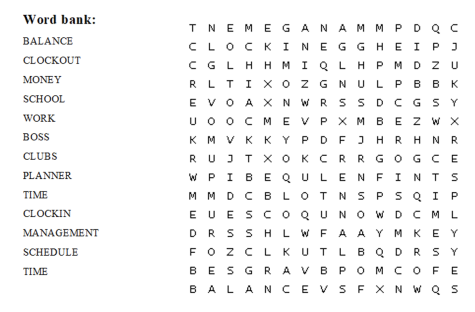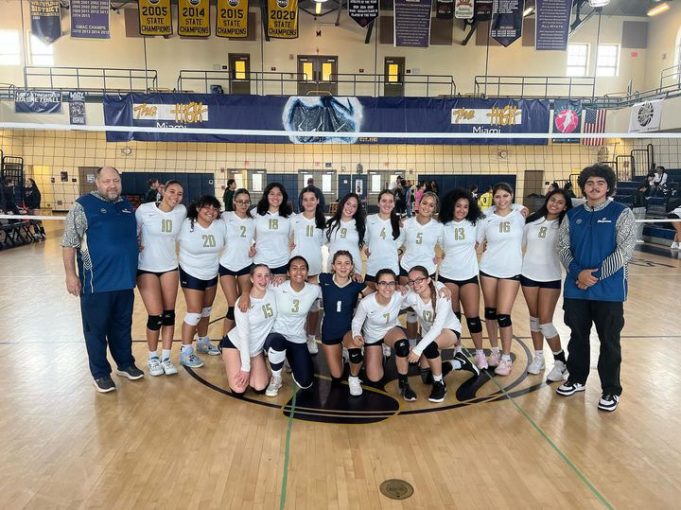Balancing School Work, Extracurriculars, and a Job
February 25, 2022
Working while going to school is hard, and more than enough people can attest to that. Having to balance an 8 hour+ school day with a 4 hour+ workday up to 5 days a week is very demanding.
Not to mention the after-hours responsibilities asked of high school students like homework, projects, and presentations—and those are only the academic demands. Students who are also involved in clubs or might have leadership positions in clubs face an even more daunting challenge: balancing work, school, and clubs.
It’s easy to see how one can become overwhelmed with so many tasks on the to-do list. So, I interviewed:
- students who take rigorous classes and have a job;
- students who take rigorous classes, have a job, and are involved in extracurricular activities;
- students that take rigorous classes and are involved in extracurricular activities. I dove into each aspect of having a full plate. Here’s what the interviewees said.
Time Management and Prioritization
Brenda Davila and Shelsie Moncada are seniors that have a job, take rigorous classes, and are involved in extracurriculars. Brenda’s favorite technique to manage her time is using a planner. She explains, “High-demanding courses require a lot of time and schedule organization; however, I always try to leave space for club activities, meetings, volunteer events, socials, among others.” When asked how she prioritizes her responsibilities, she responded, “I firmly believe academics will always be more important. Being involved will indeed help you during the college application process, but maintaining a good GPA should be a top priority in high school.”
Shelsie, on the other hand, said, “Many people argue that school comes first, which is correct, but I believe that being responsible includes providing the same amount of dedication to everything you do.” She also broke down her weekly schedule: “I have a set schedule for afterschool rehearsals, and those days are my days off from work.”
Paris Interian, a senior who takes rigorous classes and has a job, responded similarly when asked about her time management strategies. “I have Monday’s and Tuesday’s off so I can just focus on getting any work/projects out of the way,” she said. “To be able to work and maintain my grades in school, I pace myself and focus on organization and time management.”
When I asked Alexandra Villagra—another senior that has a job—how she prioritized her tasks, she responded, “I complete my assignments between classes or during my monitor periods. I try to also complete tasks while at work when I am not so busy. When I have appointments or places to go, I schedule my working shift at a different time.”
Emily Chouza, a working senior that is involved in extracurriculars and takes rigorous classes, also uses Brenda’s strategy of keeping an annotated planner to track her events and also believes that schoolwork comes before her other responsibilities. She listed her priorities in the following order: school, extracurriculars, and then her job.
On the other hand, Julie Olivera, a full-time working senior, said she completes all her assignments in class and has a really hard time scheduling and managing her time.
Mental health and involvement
Alexandra, Paris, Shelsie, and Emily all agreed that their mental health was negatively affected when first starting their jobs. Emily said that working is definitely an “added stressor,” but her mental health is improving because she doesn’t have much time to allow negative thoughts to crowd her thinking.
Shelsie responded similarly, “Of course there are times when I feel like I can’t keep up, but this is merely a peak that I reach after having too much going on in my personal life and school.”
Paris described herself as feeling overwhelmed sometimes. She said having a job caused her to have anxiety attacks, but she tries to realize that managing her time keeps her organized and calms her down. She also said, “It’s been a confidence and maturity booster because when I do accomplish everything, I feel proud for being able to do both at such a young age.”
Pros of being involved in and out of school
There are some advantages regarding involvement in and out of school. Brenda, who is part of BETA, NHS, SNHS, In Touch, and SGA, said that being involved helps to maximize the high school experience as well as expands students’ social circle. “It benefits students to find friends with the same interests. During my participation in clubs, I developed more self-esteem, and my social and speaking skills improved,” said Brenda.
Shelsie, who is part of the school choir, the band, and various clubs, agrees with Brenda about maximizing the high school experience. She also explains how having a job helped her with becoming more independent and mature.
Emily, who is president of the Interact club and First Vice President of SGA, said, “The amount of memories I’ve made the past four years, the amount of amazing people I’ve met, and the amount of relationships I’ve created even with teachers are the most prominent pros of being involved in and out of school.”
Cons of being involved in and out of school
However, there are disadvantages of having such a full plate. Brenda answered, “Being involved in clubs requires lots of time, not only during school hours, but I remember spending summers, weekends, and after-school hours just on club activities.”
Shelsie responded similarly: “For band and choir, it is not only the rehearsals but also the concerts and the actual performances that take up a large part of my schedule. Having to adjust my work schedule with my afterschool hours is extremely difficult.”
Why get a job?
There are advantages to having such a packed schedule. Paris said, “Being involved in and out of school, especially at this age, you are preparing yourself for life after high school and learning more about responsibility and ultimately growing as a person to be the best adult you can.”
Julie, who is in the rigorous teaching magnet and works at an afterschool center, believes a very important pro is the money you are able to use for yourself. Emily also said that in spite of the added stress that a job adds to one’s shoulders, a major advantage is the money made while working.
Alexandra thinks that a major con of working is the learning that doesn’t happen because you have to work. She remarks, “Sometimes you have two things scheduled at the same time and you must make a wise decision in order to succeed.” Paris emphasized how isolating it can feel to miss out on afterschool activities because you have to work.
When to get a job
When is the right time to get a job? Julie responded that the right time is when students are preparing to graduate because “having 8 classes and a job wouldn’t be the best idea.” On the other hand, Paris said that the right time is subjective, but if a student does not mind missing out on school events, “Start young.”
Shelsie didn’t give a concrete age, but she did say, “School is not an impediment, and a person shouldn’t not work because they have school.” She elaborated on how it’s all about balance: “I’ve been able to keep with all of my schoolwork, participation in groups and extracurriculars, my job, and social life after over two years of working.”
How having a job prepares you for the future
Alexandra and Paris both answered that having a job prepares you for the professional workplace setting. Alexandra expressed, “You learn how it is to interact with a boss, clock in and out responsibly, and you learn how to interact with customers.”
Paris agreed: “You will meet a bunch of new people of different ages who will open your mind to different perspectives on life and you will also make connections. [Working] boosts your maturity exponentially and makes you more inquisitive.”
Julie said that having a job is a great resume builder, and a better resume leads to a better job, which leads to a better-paying job and more opportunities.
Emily’s job is in the particular field that her future profession lies in—elementary school special education—so by practicing her skills now with special education elementary school students, she is gaining experience and knowledge for the future.






